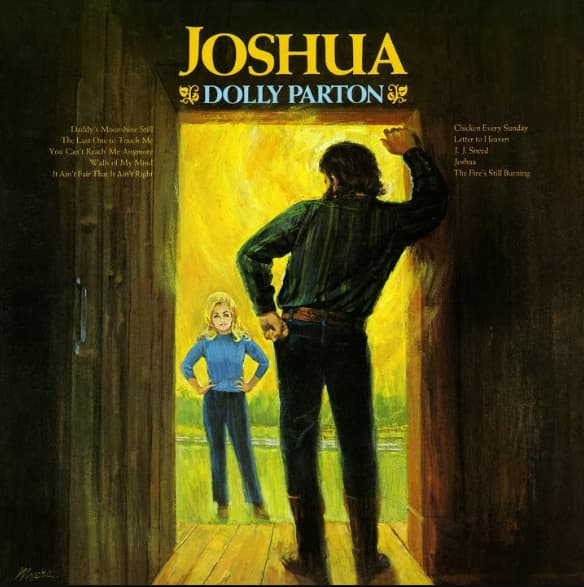
A Tale of Unwavering Friendship and Solitude
In the annals of country music history, some songs don’t just tell a story; they build a world, a dusty, sun-drenched landscape populated by characters who feel as real as the people in your own life. One such unforgettable creation is Dolly Parton‘s 1970 gem, “Joshua.” This isn’t a chart-topper that blazed across the airwaves with a flashy chorus; its appeal lies in its quiet power and haunting narrative. Released in September 1970 as the first single from the album of the same name, “Joshua” climbed to the top of the Billboard Hot Country Singles chart, securing the number one spot and marking a significant milestone in Parton‘s burgeoning career. It was a testament to her songwriting prowess, proving that she could captivate audiences with more than just a sweet melody.
The song’s story unfolds like a folk tale whispered around a campfire. It’s the story of a young woman who, out of curiosity or perhaps a touch of loneliness, ventures toward a mysterious, reclusive figure named Joshua. He’s described as an imposing, almost fearsome presence—a “hermit” living alone in a secluded cabin, his reputation preceding him. The townspeople, in their collective wisdom and fear, have painted him as a dangerous, “crazy” man, a boogeyman to scare children. But our narrator, fueled by a deep-seated empathy that so often defines Parton‘s characters, sees something more. She sees a human being, isolated and misunderstood. This is the heart of the song’s emotional resonance: the willingness to look beyond the surface, to challenge the prevailing narrative, and to seek connection where others see only danger.
Dolly Parton‘s delivery is what elevates “Joshua” from a simple narrative to a profound experience. Her voice, so rich and full of life, carries a sense of trepidation and curiosity in the early verses. You can hear the nervousness in her tone as she approaches the cabin, the slight tremor that speaks of her uncertainty. But as the story progresses, a transformation occurs. The fear gives way to understanding, and the song’s atmosphere shifts from one of suspense to one of gentle melancholy. We learn that Joshua isn’t the monster the town has made him out to be; he is simply a lonely man, scarred by life’s hardships, who finds solace in his solitude. The song subtly hints at a tragic past, a reason for his isolation, though it never explicitly states what it might be. This ambiguity allows the listener to fill in the blanks, to project their own understanding of loss and loneliness onto his character.
The true magic of “Joshua” lies in the bond that forms between these two solitary souls. It is not a romantic love story, but something deeper and more poignant: a friendship born of mutual respect and shared isolation. She sees his humanity, and he, in turn, finds someone who isn’t afraid of him. This simple, profound connection is a powerful reminder that even in the most desolate of circumstances, a flicker of companionship can light up the darkness. The song’s legacy is a testament to this enduring message. It’s a beautifully crafted piece of art that speaks to the universal human desire for understanding and acceptance. It reminds us of a time when stories were told with a deliberate, gentle pace, allowing us to get lost in the world and the feelings they evoked. For those who remember hearing “Joshua” for the first time, it was a moment of quiet revelation—a song that didn’t just entertain but also made you feel a little less alone in the world.